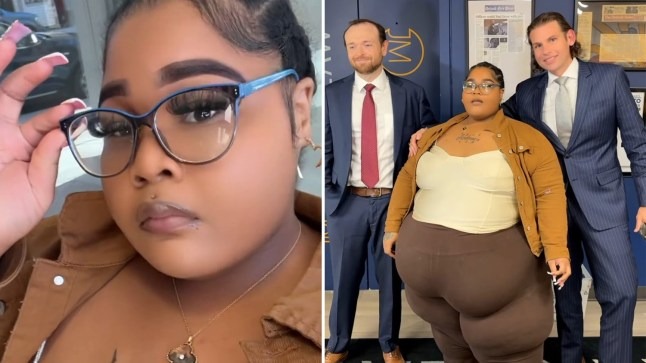HT6. Lawsuit Against Lyft: Rapper Claims Discrimination Due to Her Size
In a recent incident that has sparked significant controversy, Dajua Blanding, a plus-sized rapper known by her stage name, Dank Demoss, has filed a lawsuit against Lyft after a driver allegedly refused to give her a ride, citing her size as the reason. The 30-year-old musician claims that the refusal was both discriminatory and harmful, leading her to seek legal action against the ride-sharing company and the unnamed driver.
The incident took place on January 18, 2025, when Blanding requested a Lyft to travel from her home to her cousin’s house for a football game watch party in the Detroit area. When the driver arrived about 10 to 15 minutes later, Blanding was left shocked and frustrated as the situation quickly escalated.
The Incident: A Heated Exchange

According to Blanding’s TikTok post, which has since gone viral, the driver of the Honda Civic appeared hesitant to let her into the vehicle. As she approached the car, the driver allegedly informed her that she was “too big to fit in the back seat.” Blanding, taken aback, questioned the driver, asking, “What makes you think I can’t fit in this car?”
The situation soon escalated as the driver, who has been identified in legal documents as “John Doe,” gave an explanation that further baffled Blanding. He said that his tires were too “tired” to support her weight. As the conversation continued, Blanding pushed back, asking what her size had to do with the vehicle’s tires. The driver responded by claiming there was “no space in the back,” citing the lack of room as the reason for his refusal.
Ultimately, after a brief back-and-forth, the driver canceled the ride, leaving Blanding stranded outside her home. She later shared the details of the interaction on social media, where many social media users expressed strong opinions on both sides of the argument.
The Lawsuit: Allegations of Discrimination

On January 27, 2025, Blanding filed a lawsuit against both Lyft and the unnamed driver. In the complaint, Blanding accuses the driver of denying her a ride due to her weight and claims that this refusal violated her civil rights. Her attorneys argue that discrimination based on body size is as harmful and illegal as discrimination based on race, gender, or religion. The lawsuit, which was filed in a Michigan court, claims that the driver locked the car doors and attempted to drive away when Blanding approached the vehicle.
The suit also asserts that the driver suggested she order a Lyft XL, which accommodates larger groups, claiming that her regular ride would be insufficient due to her size. However, Blanding insists that she did not need a larger vehicle and that the driver’s refusal was unfounded.
Blanding’s attorneys, John Marko and Zach Runyan, have strongly condemned the actions of the driver. Marko argued that refusing transportation based on weight is a clear form of discrimination. “Discrimination of any kind should never be tolerated in our society,” he stated. Runyan echoed this sentiment, emphasizing the potential dangers of leaving someone stranded and unable to access essential services. “Imagine the consequences if Ms. Blanding were unable to seek shelter after the driver left her stranded. This could have ended even worse than it did,” Runyan added.
Online Debate: Was the Driver Justified?

Following the incident, many online users took to social media to voice their opinions on the matter. Some supported the driver, arguing that safety and functionality should be prioritized when it comes to ride-sharing services. One Facebook user commented that the car was too small for the passenger and that the driver’s decision was justified from a safety standpoint. “That car was obviously too small. The extra weight would have destroyed his transmission, tires, shocks, and dislodged the front passenger seat,” the user wrote.
Another commenter expressed similar sentiments, stating, “Cars can only safely hold a certain amount of weight. This wasn’t discrimination; it was a safety issue.” Some critics suggested that Blanding should have ordered a larger vehicle to ensure comfort and safety.
However, there were many who sided with Blanding, calling out the driver’s actions as discriminatory. One user pointed out that body size should not be a reason for refusing service, emphasizing the importance of respecting all individuals regardless of their appearance.
Among those who expressed support for Blanding was a self-identified “big, beautiful woman” (BBW) who shared her own experience with ride-sharing. She acknowledged that some larger passengers opt for Lyft XL vehicles but argued that refusing service based on size was wrong. “I get an XL ride to be comfortable, but being denied service outright is unacceptable,” she wrote.
Emotional and Financial Damages: Blanding’s Legal Demands
In her lawsuit, Blanding is seeking compensation for a range of damages, including emotional distress, humiliation, and mental anguish. She claims that the incident caused her severe emotional distress, which affected both her well-being and daily life. Additionally, Blanding is demanding compensation for economic damages, including legal fees and court costs.
Blanding’s legal team believes that the case could have broader implications for the way ride-sharing companies like Lyft handle discrimination claims. As the legal proceedings continue, it will be interesting to see how the courts respond to the claims of weight-based discrimination.
Lyft’s Response
In a statement, Lyft expressed their commitment to upholding principles of equality and mutual respect. “Lyft unequivocally condemns all forms of discrimination – we believe in a community where everyone is treated with equal respect and mutual kindness,” the company said. They further emphasized that their community guidelines explicitly prohibit harassment or discrimination.
Despite this, the incident has raised questions about how well Lyft’s policies are enforced and whether changes are needed to ensure that incidents of discrimination do not occur in the future.
Looking Ahead: The Future of Rideshare Policies
This case highlights a significant issue that may affect many passengers in the future – the potential for discrimination based on body size. As rideshare services continue to grow in popularity, this case could serve as a catalyst for change, prompting companies like Lyft to revisit their policies and training procedures for drivers.
For now, all eyes are on the outcome of this lawsuit, which could have far-reaching consequences for the ridesharing industry. Whether or not the court rules in Blanding’s favor, it is clear that incidents like these raise important questions about accessibility, fairness, and safety within the rideshare ecosystem.
Conclusion
The lawsuit filed by Dajua Blanding against Lyft sheds light on the sensitive issue of discrimination based on body size in public services. While there is no clear consensus on whether the driver’s refusal was justified, this case serves as an important reminder that all forms of discrimination—whether based on weight, race, gender, or any other factor—should be addressed seriously. As legal proceedings unfold, it is essential that both the public and rideshare companies consider the broader implications of such incidents, ensuring that all passengers are treated with respect and dignity.













